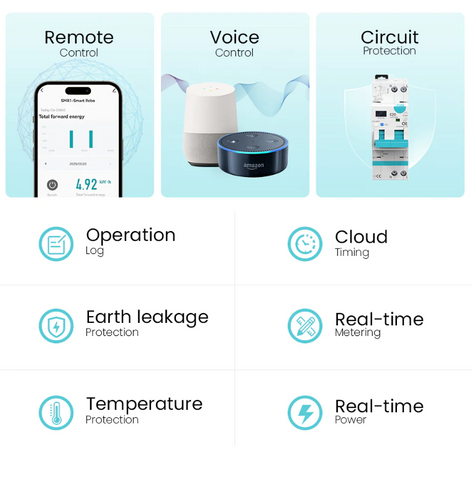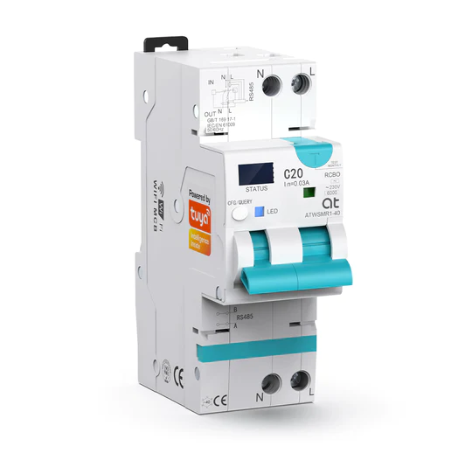Is a Smart Breaker Really Worth the Price Tag?
In recent years, the world of home automation has seen remarkable advancements, making our lives more convenient and efficient. Smart thermostats, lights, locks, and even refrigerators have become common features in modern households.
Among these innovations, the smart breaker, also known as a smart circuit breaker or smart electrical panel, has started to gain attention. But is a smart breaker really worth the price tag? In this blog post, we'll delve into the world of smart breakers, exploring their features, benefits, drawbacks, and the ultimate decision on whether they are a worthy investment for homeowners.
What are Smart Breakers?
Before we delve into the cost-benefit analysis, it's important to understand what a smart breaker is and how it works. A smart breaker is essentially a digitally enhanced version of a traditional circuit breaker that is used to protect your home's electrical system from overloads and short circuits. However, it goes beyond just safety; it offers homeowners the ability to monitor and control their power consumption remotely through a smartphone app or a web interface.
Key Features of Smart Breakers
- Remote Monitoring: One of the most significant advantages of smart breakers is the ability to monitor your home's electrical usage remotely. With real-time data, you can keep track of which appliances or circuits are consuming the most energy and make informed decisions to reduce your electricity bills.
- Remote Control: Smart breakers allow you to remotely control individual circuits or turn off power to specific devices or rooms, providing convenience and energy savings. For instance, you can turn off lights, heaters, or other appliances when they are not in use, even if you're away from home.
- Safety Alerts: Smart breakers can send you alerts or notifications in case of abnormal electrical activity, such as overheating or a circuit overload. This early warning system can help you prevent electrical fires or damage to your appliances.
- Energy Usage Insights: Many smart breakers offer detailed energy usage insights and historical data. This information can empower homeowners to make energy-efficient choices and optimize their electricity consumption.
- Integration with Smart Homes: Smart breakers can seamlessly integrate with other smart home devices and platforms, allowing for centralized control and automation. For example, they can work in tandem with your smart thermostat to optimize heating and cooling based on your energy cost.
The Benefits of Smart Breakers

- Energy Efficiency: One of the primary benefits of smart breakers is the potential for increased energy efficiency. By monitoring and controlling your electrical usage more effectively, you can reduce your electricity bills and minimize your carbon footprint.
- Convenience: Smart breakers offer unparalleled convenience. Imagine being able to turn off the oven you forgot to switch off before leaving for work or remotely cutting power to a room with unnecessary lights and devices. It's the kind of convenience that can make your life easier and more efficient.
- Enhanced Safety: Smart breakers enhance the safety of your home by providing real-time monitoring and alerts for electrical issues. This can help prevent accidents and costly damage to your home.
- Peace of Mind: Knowing that you have control over your electrical system even when you're not at home can provide peace of mind. You can check on your home's electrical status at any time, whether you're on vacation or at the office.
- Long-Term Savings: While smart breakers may have an upfront cost, the potential long-term savings on your energy bills can offset the initial investment. Additionally, the ability to extend the lifespan of your appliances by controlling their usage can save you money in the long run.
Drawbacks and Challenges of Smart Breakers
While smart breakers offer compelling advantages, they are not without their drawbacks and challenges. Here are some of the key considerations:
- Cost: The biggest hurdle for many homeowners is the initial cost of smart breakers. They are typically more expensive than traditional circuit breakers, both in terms of hardware and installation.
- Compatibility: Not all homes are immediately compatible with smart breakers, and retrofitting your electrical panel can be a complex and costly process. Compatibility issues can also arise when trying to integrate smart breakers with existing smart home ecosystems.
- Security Concerns: As with any smart device, there are potential security risks associated with smart breakers. It's crucial to choose a reputable brand and ensure that your network is secure to protect against hacking or unauthorized access.
- Technical Expertise: Operating and troubleshooting smart breakers may require a certain level of technical knowledge. Homeowners who are not tech-savvy may find it challenging to fully utilize these devices.
- Dependency on Technology: Smart breakers rely on technology and a stable internet connection. If there are issues with your network or if the manufacturer discontinues support for their mobile app or platform, it could affect the functionality of your smart breaker.
Are Smart Breakers Worth the Price Tag?

The decision on whether a smart breaker is worth the price tag ultimately depends on your specific circumstances and priorities. Here are some factors to consider when making this determination:
- Budget: If you have a tight budget, the upfront cost of a smart breaker may be a significant factor. However, keep in mind that the long-term energy savings and potential increase in home value could offset the initial investment.
- Energy Goals: If you're committed to reducing your energy consumption and carbon footprint, a smart breaker can be a valuable tool to help you achieve those goals. It provides the data and control needed to make informed decisions about your electricity usage.
- Home Automation: If you already have a smart home ecosystem in place, adding a smart breaker can enhance your overall home automation experience. It can integrate with your existing devices and offer seamless control.
- Home Safety: If you prioritize home safety and want the peace of mind that comes with real-time monitoring and alerts, a smart breaker may be worth the cost. It can help prevent electrical fires and accidents.
- Long-Term Perspective: Consider whether you view your home as a long-term investment. If you plan to stay in your current home for many years, the benefits of a smart breaker may become more apparent over time.
- DIY vs. Professional Installation: Some smart breakers are designed for DIY installation, while others require professional installation. The installation process can impact the overall cost and convenience.
Conclusion
In the rapidly evolving world of home automation, smart breakers offer a range of features and benefits that can enhance the convenience, energy efficiency, and safety of your home. However, they come with an upfront cost and technical considerations that may not be suitable for every homeowner. To determine whether a smart breaker is worth the price tag, it's essential to assess your budget, energy goals, home automation setup, and long-term perspective.
Ultimately, the decision should align with your specific needs and priorities. If the potential energy savings, convenience, and peace of mind outweigh the initial investment, a smart breaker could be a valuable addition to your home. However, it's crucial to research different brands, assess compatibility, and prioritize security to make an informed choice. As technology continues to advance, the smart breaker market may become more accessible and affordable, making it an increasingly attractive option for homeowners seeking a smarter, more efficient home.
Contact:
AT-ELE
sale@at-ele.com
www.at-ele.com




